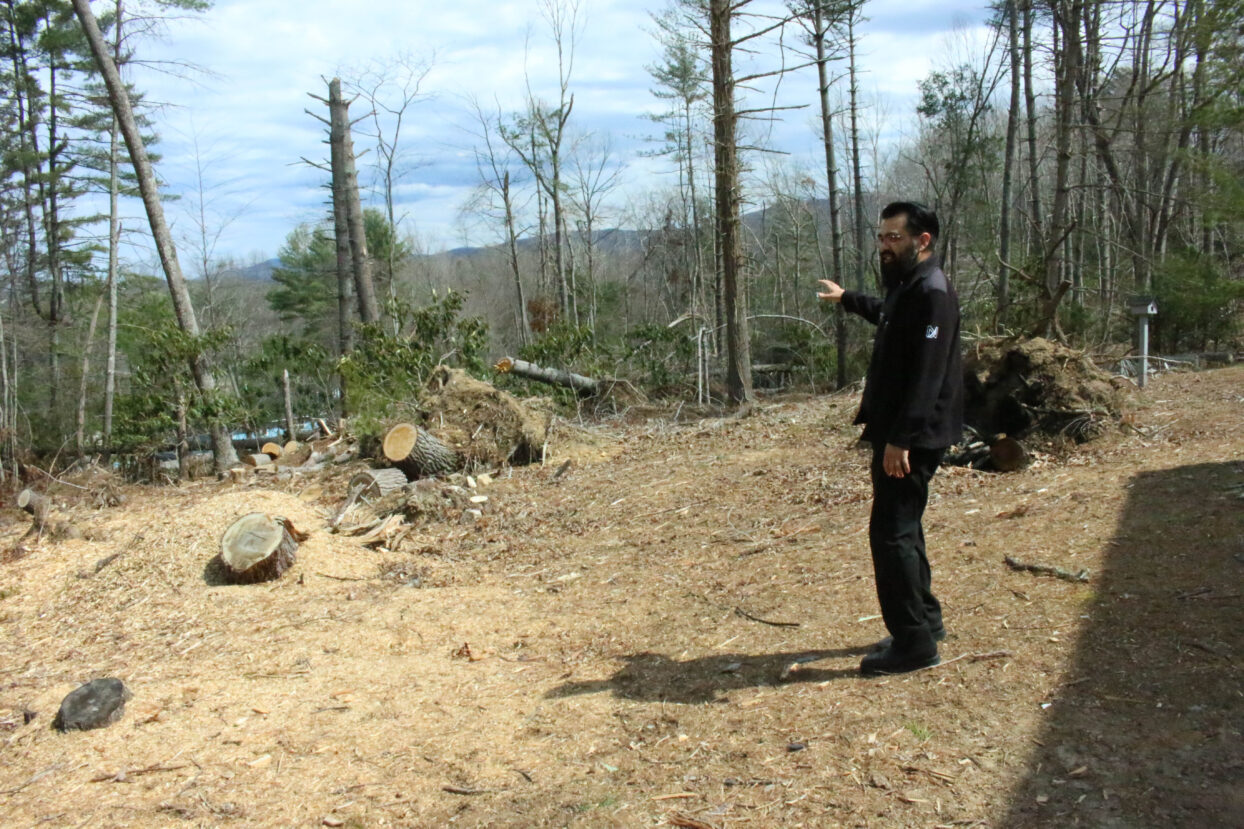God sent His workers to help in disaster recovery
By Dan McWilliams
Father Jesús Guerrero, having been in Texas for a family event when Hurricane Helene’s flooding ravaged East Tennessee on Sept. 27, noticed one thing when he flew back in to Tri-Cities Airport in Blountville two days later.
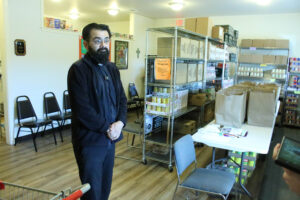
Father Jesús Guerrero, pastor of St. Anthony of Padua in Mountain City, stands inside the St. Anthony Bread food pantry. The pantry, the largest in Johnson County, assisted local residents in the wake of the flooding. (Photo Dan McWilliams)
The pastor of St. Anthony of Padua in Mountain City had been alarmed by the near-total lack of information about damage in the town in the diocese’s northeast corner, as all power, cellphone communication, and utilities were out of commission.
“My first impression was, when we were getting closer to the Johnson City area, it was just pitch black, no lights. There were no lights at all, not even in Johnson City,” Father Guerrero said. “They lost power in most of the town. No power in Mountain City.”
Father Guerrero, also pastor of St. Elizabeth, spent that Sunday night in Johnson City and was driven to Mountain City from his Elizabethton parish the next day and saw on the way the severe damage in the Hampton community in Carter County. Elizabethton’s main remaining damage from the storm is the closed Broad Street bridge, scheduled to reopen in early July.
“I didn’t know anything about Hampton at that point. They told me that Elizabethton suffered some flooding, but there was no real damage in the town. On our way here, they decided to stop by Hampton, especially where the high school is in that area, and I was in shock by what I saw,” he said.
“What I saw was kind of a war-zone image, because people were looking in the debris for their belongings. Homes destroyed, washed away by the water. It was bad, bad. If I could describe it, it was a war zone because people—you could see it in their faces that they had lost everything. They knew. That was Monday morning—it had been like three days already—they were still looking for their belongings, whatever was left.”
Father Guerrero was attending his niece and goddaughter’s quinceañera in Texas when the flooding occurred. He had intended on that Sunday to fly down to Mexico to see his parents but changed his plans. He was unable to hear firsthand reports from Mountain City because of the cellphone service being down.
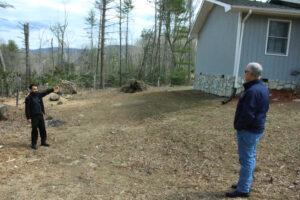
Father Guerrero and Deacon Joe Herman stand outside the rectory, which sustained wind damage, at St. Anthony of Padua. (Photo Dan McWilliams)
“When I heard through the news and people sending me text messages, it was not people from St. Anthony because we lost any type of communication. There was no cellphone reception, no electricity, no running water—there was nothing here in Mountain City,” Father Guerrero said in a March 25 interview, which also included St. Anthony of Padua Deacon Joe Herman.
Word had gotten out quickly about the fatalities and storm damage in Erwin in Unicoi County while Father Guerrero was still in Texas.
“I started learning about what happened through people from Unicoi because they were asking me for prayers. They had missing people, people I knew from St. Mary’s in Johnson City, my former assignment,” Father Guerrero said. “I started checking the news, and I was seeing images that were pretty bad about Erwin, but I didn’t know anything about Mountain City at that point.
A bleak picture
“It wasn’t until the next day, Saturday, when I contacted Deacon Joe and asked him if there was any damage in Mountain City. He replied back with some pictures of our rectory here, and the pictures were not good. The rectory was covered in trees and branches, and it was pretty bad. The shed was pretty much demolished by a tree.”
Those photos sent by Deacon Herman started Father Guerrero worrying, he said in the interview at his church in Mountain City.
“Then I tried to contact people around here, and nobody replied back, so I was even more worried because I didn’t know anything. I was getting anxious because I wanted to get back,” he said. “My mind wasn’t there [in Texas] anymore—I was thinking about Mountain City. I made arrangements so I could get back the following day, which was Sunday. Instead of going down to Mexico, I came back.”
When he returned to the diocese, Father Guerrero could communicate with parishioners of St. Elizabeth in Elizabethton.
“I was asking them for a ride, and they were telling me, ‘Father, I don’t think it’s going to be possible for you to get to Mountain City,’ and now I was thinking, ‘OK, this is bad,’” he said. “Somehow, I got here, and Deacon Joe met me at the rectory. When we got there, we saw how bad it was. It was not only the rectory—it was the whole neighborhood. Every single home had wind damage, all of them. Some homes were worse than the rectory. And that’s when everything hit me—I was like, this is bad.”
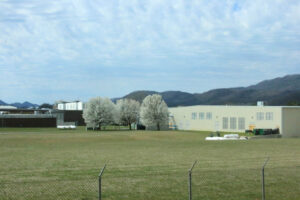
Parkdale Mills’ facility in Mountain City was forced to close after the Helene flooding, putting several parishioners of St. Anthony of Padua out of a job. Many of them lived in apartments across from the plant and had to be evacuated as the water rose. (Photo Dan McWilliams)
Deacon Herman then informed Father Guerrero that the Parkdale Mills plant, which employed several Hispanic parishioners of St. Anthony of Padua, sustained flooding damage as did the apartments across the street from the plant where those same parishioners lived. Parkdale Mills, an international yarn manufacturer, permanently closed its Mountain City facility in early December because of the storm damage.
Mountain City, home to Deacon Herman’s company, Danny Herman Trucking, sustained a “mixture between the flood and the wind damage,” the deacon said in thinking back.
“From what I remember, those who weren’t necessarily affected by flooding, they got the wind damage, like up at the rectory,” he added. “One of our employees at Danny Herman Trucking lives kind of across the street from Father Jesús—a tree fell down and took out their carport. The whole neighborhood—most of the homes sustained some form of damage, some serious, some not as serious, but there was some damage. Most of that was wind.”
Some of the Parkdale Mills employees were at work when the plant flooded, but the river current was not as strong as that in Erwin, where several lives were lost outside of an industrial plant, Father Guerrero said.
The storm, however, devastated the lives of the Parkdale Mills employees, who lost their jobs, their automobiles, and their apartments.
“All the cars were in the parking lot, so they were totaled. They not only lost their jobs, they lost their belongings, their homes. They lost their cars,” Father Guerrero said. “That’s when we understood the magnitude of the problem. I knew this was not going to be like something you could fix in a week or two. I knew it was going to take a long time to get back to normal.”
The communications cutoff may have temporarily delayed aid to Mountain City, but that help did come. Father Guerrero got the word out to Blanca Primm, director of Hispanic Ministry for the diocese; to Father Michael Cummins, pastor of St. Dominic in Kingsport; and to Deacon David Duhamel, executive director of Catholic Charities of East Tennessee.
“When I saw that in Hampton, I decided to contact the diocese. I contacted Blanca Primm first and Father Michael Cummins, then contacted Deacon David Duhamel, to let them know how bad it was around here,” Father Guerrero said. “I was taking pictures, and I text-messaged those pictures to them because it was really bad. I think everybody was focusing on what happened in Erwin because it reached national news—the image of people asking for help from the hospital roof in Unicoi County. … It wasn’t until I sent those pictures and short videos to Blanca Primm, and I asked Blanca, ‘Please share these with everybody in the Chancery office. They need to know what’s going on here. We need help.’ And she did that, and Deacon Dave Duhamel reached out to Deacon Joe and to me, and the following day they were sending help.”
Deacon Herman said “when there’s a disaster there are stages as far as what kind of supplies they send. The most immediate need was for drinking water.”
People were “walking on the streets” of Mountain City “because there was no gas, no electricity, no cellphones, no running water,” Father Guerrero said. “I remember that first week that people were walking to our church asking us if they could use our shower.”
Father Guerrero returned to Elizabethton for the first couple of nights but decided to stay in Mountain City afterward, “in a rectory with a tree on the roof. There were ticks all over the place. We were without cellphone reception for one week.”
Parishioners of St. Elizabeth urged Father Guerrero to stay in a hotel in Elizabethton, but he slept on a couch in the church office. The rectory there was undergoing renovations at the time, although the work on it is now complete.
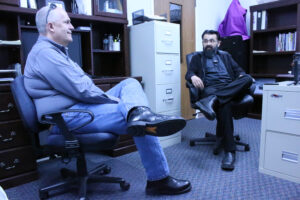
Deacon Joe Herman and Father Jesús Guerrero talk about the flooding from Hurricane Helene as they sit in an office at St. Anthony of Padua Church in Mountain City, where Father Guerrero is pastor. (Photo Dan McWilliams)
“I didn’t have any blanket, anything. I wasn’t prepared for it,” Father Guerrero said. “I used one of my albs as a blanket, just to cover myself at night. I spent a couple of nights there, and then I decided not to, even though they were pushing, really insisting, ‘Father, get a hotel. We’ll pay for it. You need to rest. You need to be safe.’”
But he had his parish in Mountain City on his mind.
“I was thinking about these people here, and I was like, ‘I cannot abandon them. I’ve got to go [to St. Anthony],” Father Guerrero said. “That’s when I started staying in this rectory. It wasn’t that bad on the inside, really. It was just outside. I describe that as God putting His hands around the house. It was just damaged on one side by two trees, but the rest of the house was just fine.
“There was no electricity, no utilities, but I was not the only person in the neighborhood without—pretty much everybody was all in the same boat. I think it was important for me to feel I was on the same boat with them, and so that’s why I stayed. I wanted to be sensitive to what others were experiencing, especially those who lost everything.
St. Anthony of Padua operates the St. Anthony Bread pantry, the largest in Johnson County, and that drew people to the church seeking food.
“They were coming to see if we had anything to share with them. At first, those who volunteered at the food pantry were affected by the storm as well. Almost no one was able to come here, even to try and help others, because they had their driveways blocked by dozens of trees,” Father Guerrero said, with Deacon Herman adding that “they were in an area that maybe had eroded and flooded out.”
The St. Anthony Bread staff did its best to get to the building on the church campus after the storm hit.
“Several of the parishioners who operate the food pantry couldn’t get out, but those who could really went above and beyond,” Deacon Herman said. “Our food-pantry folks do a dynamic job.”
So many came to St. Anthony that “honestly, I didn’t know how to help them. It was overwhelming,” Father Guerrero said.
Deacon Herman agreed.
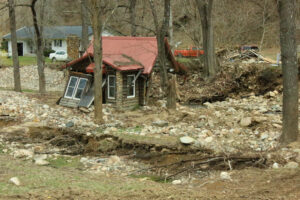
A cabin along U.S. Highway 421 near the North Carolina line in the Trade area of Johnson County shows damage from the flooding. (Photo Dan McWilliams)
“It was overwhelming and helpless. For me, it was like you knew what you had to do, but where do you start? That’s kind of how I would describe it,” he said. “It really worked on me, spiritually and internally, and feeling kind of like guilt, because where I live, I live up on a hill and don’t have any trees around me. If I had to worry about flooding, they’d have had to have an ark because I sit up high enough. We have a generator at our house, so we had access to water. You knew the need was so great, but where do you start?”
East Tennessee Catholics came to the rescue of St. Anthony.
“People from St. Mary’s in Johnson City, parishioners—especially those owning companies, business owners—started calling me and asking me if we needed any help,” Father Guerrero said. “That was a godsend because we did need that help. They went to Johnson City’s stores and got us air mattresses, space heaters—even though it was in September, the temperature up here at night, especially at that time of year, drops all the way to 30 degrees.”
Having no electricity added to the hardship in the chilly weather, and those in the apartments across from the Parkdale Mills plant remained there but got sick from mold.
“They didn’t have anywhere to go, literally nowhere to go, so they were staying there as it was. They were getting sick,” Father Guerrero said. “They had kids, even babies. They had lost pretty much everything: furniture, clothing, cars, everything. There was no job—the plant was flooded. There wasn’t any income. It was like Deacon Joe said, I felt like I couldn’t help them. I was helpless.”
St. Anthony’s Mass in Spanish saw increased attendance in the wake of the storm.
“We used to have 15-20 people attend on a good Sunday. After the hurricane, we had 60 to 80 people attending the Spanish Mass,” Father Guerrero said.
Much of those increased numbers is due to the fact that volunteers originally in need of help after the flooding hit began assisting in the recovery and then going to the church themselves.
“These people came to seek help. They saw the need to help, so they started volunteering. I didn’t know them. They offered their help, and I accepted their help to unload the trucks, and eventually they became my helpers,” Father Guerrero said. “They started getting involved with St. Anthony. We put a team together helping every day with the distribution of goods, and eventually the food-pantry volunteers started coming regularly to help out. We set up schedules to help the community, and eventually those volunteers who happened to be Catholics affected by the floods not only started helping in the distribution of goods but also started coming to Mass.”
One person in Johnson County died in the flooding, but others left the community to find employment at the Parkdale Mills plant in Sparta, N.C., a couple of counties east of Mountain City.
The pastor of St. Anthony helped others find jobs locally.
“Father Jesús I know helped a lot of those people who were working at Parkdale Mills with jobs in Elizabethton, Johnson City, and Kingsport through connections he has,” Deacon Herman said. “Not everybody left, but we lost people because they had to leave. They didn’t lose their lives. Fortunately, as far as I know, there was only one death in our county because of the hurricane. One life was too many, but fortunately we didn’t experience the loss of life here in Johnson County like they did in Unicoi County and some other areas.”
St. Anthony of Padua received a shipping container as well as aid a couple of times from Catholic Charities. Helpers also came from nearby North Carolina and Virginia.
“We were getting donations from out of state as well, trucks loaded with stuff that were stopping by in our parking lots asking us if we wanted whatever they had,” Father Guerrero said, adding that he had to coordinate the new volunteers who helped with heavy lifting with the established staff of the food pantry.
That job was a little easier than dealing with the initial shock of the storm damage.
“That was one of the challenges, that nobody was ready to face a situation like that, and I don’t know if anybody ever will be ready to do that,” the diocesan priest said. “I hope that doesn’t happen anymore.”
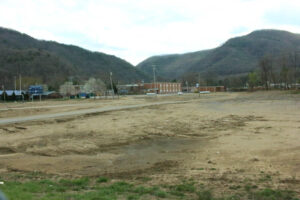
Hampton High School outside Elizabethton still shows signs of damage six months later (Photo Dan McWilliams)
Turning a corner
Deacon Herman said the parish’s early need for bottled water and canned goods was filled, and then the repairs got underway.
“People started fixing things, so you saw people donating, I think it was St. Joseph up in Illinois sent a lot of heaters, a lot of dehumidifiers, started sending a lot of the things to start rebuilding,” he said. “There were a lot of people who came from New York, Florida, Virginia, Texas, pulling a good-sized utility trailer with them, and they’d pull up in front of somebody’s house and say, ‘Hey, do you need some repairs to that?’ and they might spend a week there.”
Deacon Herman said, “There’s a silver lining in every cloud.”
“After the shock and you start the rebuilding process, it gives you faith in humanity, that there are still good people, and God sent a lot of them to Johnson County to help our people,” he said.
The cathedral parish in Cape Girardeau, Mo., sent an 18-wheeler to Mountain City.
“They sent a truck full of stuff in December,” Father Guerrero said. “That was three months later—we were still helping people. The truck had furniture. A lot of people lost everything—they needed furniture. I was asking in the Johnson City area for donations of used furniture because people needed it.”
Deacon Herman credited Deacon Duhamel and Catholic Charities for “helping a lot by sending gift cards so people could go out and buy what they needed, because different people’s needs vary. Catholic Charities was good with that. They’ve helped some people with rent, utilities, things of that nature, things that after that initial punch, they were able to start rebuilding.”
Six months later, some of the families in Mountain City are dealing with different dynamics in their households.
“Those parishioners who stayed, both mom and dad used to work—they had jobs, both of them. They managed because they had different shifts to take care of the kids,” Father Guerrero said. “But now that they lost their jobs, they’ve got a job which is probably out of town, and unfortunately, especially women are not able to get jobs as much as men.
“Now they are surviving with just one income, and a lot of times it’s not enough to provide for what they need, so they are still struggling to meet all their needs. So far, we still have some cleaning supplies in that container, and we’ve been helping them at least with that, diapers and wipes, so they don’t have to buy those with their paycheck.”
Deacon Duhamel told Deacon Herman that the door from Catholic Charities “is still open” six months afterward. “They haven’t cut us off by any means.”
The head of Catholic Charities also asked St. Anthony if the parish could help others in need.
“He asked if we could help flooding victims in Kentucky. Deacon Dave reached out to us, asking us if we had anything to share with them, to be taken to Kentucky. We immediately said yes, we do,” Father Guerrero said. “And so, we shared a little resources, what we had, with them. We know how [flooding] feels like, so we wanted to help. We needed to help.”
Highway 67 was the only usable road into Mountain City after the storm struck, but since then Highway 91 and U.S. 421 have reopened. Many roads had to have their surfaces repaired to enable them to reopen.
Leading a driving tour of those roads and the storm damage, Deacon Herman reflected on the Mountain City spirit.
“We’ve got a very resilient community. Living in a small community has its pluses and its minuses, but when something like that happens, people really dive in and help their neighbors,” he said.
Last Christmas was “tough,” Deacon Herman said, “especially for people who had younger families that were affected.”
“Catholic Charities really came through for a lot of that,” the St. Anthony of Padua deacon continued. “My goodness, they sent a lot of toys up. I know (volunteer) Rick Sample and some others shopped at Walmart, went on a pretty good shopping spree, and supplied a lot of toys and brought them up to St. Anthony’s to give out to kids that otherwise wouldn’t have had anything. They sent a bunch of coats. That was very much a blessing because we had a pretty cold winter.”

